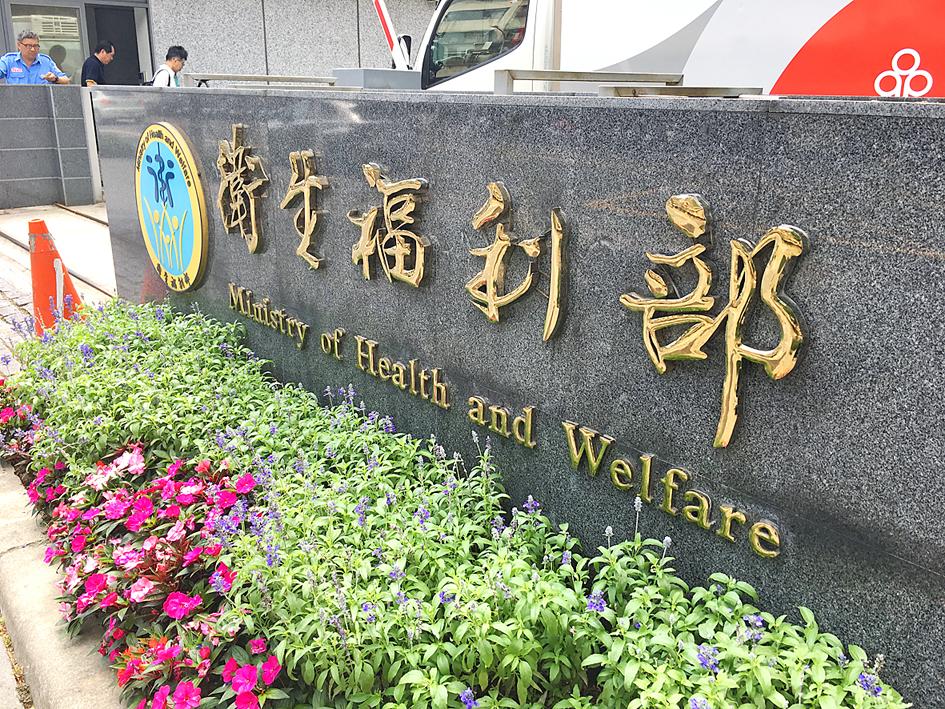While the life expectancy of Taiwanese newborns in 2018 reached 80.69 years, the number of years people spent in poor health hit a record high at 8.41 years, Ministry of Health and Welfare statistics showed on Saturday.
Healthy life expectancy is calculated by a person’s life expectancy minus the time they spend in ill health, such as the loss of mobility, disabilities and chronic disease, based on medical records and calculations about the years they live with disabilities.
The number of years that Taiwanese spend in poor health is increasing slowly, but steadily, rising by 0.46 years, or five-and-a-half months, between 2012 and 2018, Department of Statistics Lee Chiu-yen (李秋嬿) said.

Photo: Lin Hui-chin, Taipei Times
The trend corresponds to the phenomenon of Taiwan becoming a superannuated society, said Chiou Hung-yih (邱弘毅), a professor of public health at Taipei Medical University.
It also highlights the dual problem of people generally having an “irresponsible” attitude toward their health and the authorities not allocating enough funds under the National Health Insurance (NHI) system for education about maintaining good health, Chiou said.
The NHI system emphasizes treatment and is neglecting public health at large, he said.
Some people do not take their medicine on time and develop a protracted period of poor health, while others started an unhealthy lifestyle early on, he added.
Physicians only focus on treating patients and do not educate them about their health, as doing so would not bring them extra subsidies under the NHI system, he said.
That NHI premiums have not risen has also led many people to take treatment for granted and ignore what they can do for themselves to stay healthy, he said.
Chen Ying-jen (陳英仁), a geriatric specialist at Linkou Chang Gung Memorial Hospital, said the nation’s universal healthcare and quality caregivers means that people are living longer in poor health.
There is also a problem with with how Taiwanese view death, as many people would rather their family members live on life support than die, Chen said.
Taiwanese need more education about quality of life and how to deal with situations when all the medication and treatment available have failed, as well as the prospect of having to go into hospice care, he said.
Statistics showed that the number of years people lived in poor health dipped in 2016, which the ministry attributed to a major cold front that aggravated cardiovascular and lung problems and led to an increase in deaths, adding that pneumonia was the third-most common cause of death that year, and life expectancy was reduced by 0.2 years.

Right-wing political scientist Laura Fernandez on Sunday won Costa Rica’s presidential election by a landslide, after promising to crack down on rising violence linked to the cocaine trade. Fernandez’s nearest rival, economist Alvaro Ramos, conceded defeat as results showed the ruling party far exceeding the threshold of 40 percent needed to avoid a runoff. With 94 percent of polling stations counted, the political heir of outgoing Costa Rican President Rodrigo Chaves had captured 48.3 percent of the vote compared with Ramos’ 33.4 percent, the Supreme Electoral Tribunal said. As soon as the first results were announced, members of Fernandez’s Sovereign People’s Party

MORE RESPONSIBILITY: Draftees would be expected to fight alongside professional soldiers, likely requiring the transformation of some training brigades into combat units The armed forces are to start incorporating new conscripts into combined arms brigades this year to enhance combat readiness, the Executive Yuan’s latest policy report said. The new policy would affect Taiwanese men entering the military for their compulsory service, which was extended to one year under reforms by then-president Tsai Ing-wen (蔡英文) in 2022. The conscripts would be trained to operate machine guns, uncrewed aerial vehicles, anti-tank guided missile launchers and Stinger air defense systems, the report said, adding that the basic training would be lengthened to eight weeks. After basic training, conscripts would be sorted into infantry battalions that would take

GROWING AMBITIONS: The scale and tempo of the operations show that the Strait has become the core theater for China to expand its security interests, the report said Chinese military aircraft incursions around Taiwan have surged nearly 15-fold over the past five years, according to a report released yesterday by the Democratic Progressive Party’s (DPP) Department of China Affairs. Sorties in the Taiwan Strait were previously irregular, totaling 380 in 2020, but have since evolved into routine operations, the report showed. “This demonstrates that the Taiwan Strait has become both the starting point and testing ground for Beijing’s expansionist ambitions,” it said. Driven by military expansionism, China is systematically pursuing actions aimed at altering the regional “status quo,” the department said, adding that Taiwan represents the most critical link in China’s

‘REALLY PROUD’: Nvidia would not be possible without Taiwan, Huang said, adding that TSMC would be increasing its capacity by 100 percent Nvidia Corp CEO Jensen Huang (黃仁勳) on Saturday praised and lightly cajoled his major Taiwanese suppliers to produce more to help power strong demand for artificial intelligence (AI), capping a visit to the country of his birth, where he has been mobbed by adoring fans at every step. Speaking at an impromptu press conference in the rain outside a Taipei restaurant, where he had hosted suppliers for a “trillion-dollar dinner,” named after the market capitalization of those firms attending, Huang said this would be another good year for business. “TSMC needs to work very hard this year because I need a lot